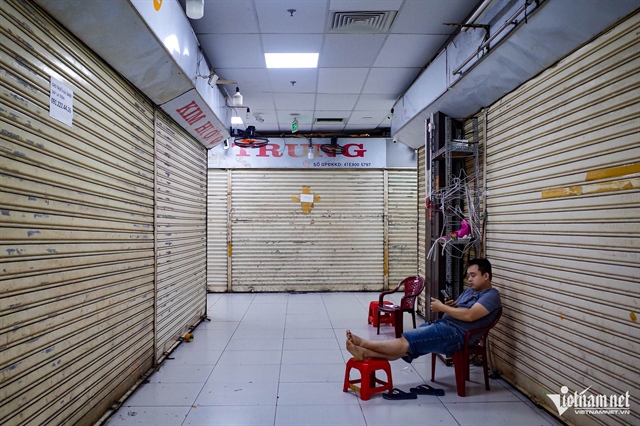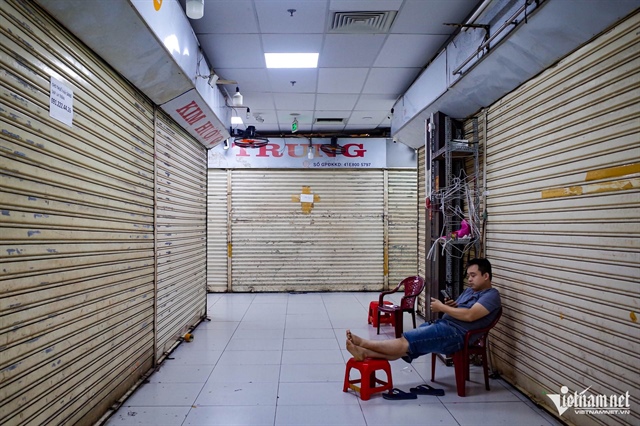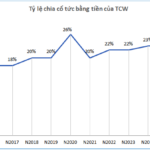These insights are from the “Report on Enterprise Situation in May 2025” by the Ho Chi Minh City Business Association (HUBA) to the city’s People’s Committee.
Specifically, regarding procedures during business operations, enterprises often dread inspections due to a focus on fault-finding rather than guidance, support, and accompaniment.
Additionally, according to HUBA, businesses face challenges when meeting conditions for purchasing goods from units with tax risks. They must ensure that inventory levels do not exceed the prescribed ratio and comply with regulations on invoices and accounting books. Any mistake can result in high fines and even criminal liability.

Many stalls are closed and not operating at An Dong Market (District 5, Ho Chi Minh City): Photo by Nguyen Hue |
For business registration procedures, the registering authority requires enterprises to have a specific, clear, and owned business address. In many cases, authorities do not approve the location of enterprises in apartment buildings, even on the ground floor, separate from other apartments. Some fields also require a practice certificate, and the passing rate for these exams is only around 20%.
Notably, regarding dissolution procedures, HUBA shared that the most significant challenge is tax finalization. This process usually takes a long time, especially for units with tax risks, resulting in a situation where “businesses cannot be buried after death.”
Given these issues, the Association proposed that the State continue to reform administrative procedures by enhancing accountability, focusing on service attitudes, and promoting digital transformation. Particularly, there should be a focus on training civil servants in public service ethics and rules of conduct to build a service-oriented and creative administration while ensuring state management requirements.
There must be a process for regular inspection and evaluation, along with a strict reward and punishment policy for all agencies, units, and individuals. This will promote positive factors, rectify negative manifestations, and reduce the phenomenon of irresponsibility and avoidance of work, which still exists among a part of the current civil servants, as mentioned in HUBA’s report.
According to statistics, in the first five months of 2025, Ho Chi Minh City had 13,894 newly established enterprises with a total registered capital of VND 79,625 billion, down 31.4% in volume and 54% in value compared to the same period in 2024. Meanwhile, supplementary registered capital reached VND 234,131 billion, up 89.7%.
The city also recorded 1,534 dissolved enterprises (up 8.4%), 20,382 temporarily suspended enterprises (up 6.7%), and 7,583 reactivated enterprises, the same as the previous period.
Tran Chung
– 05:45 12/06/2025
Local Government on Two Tiers to Commence from July 1, 2025: A Unified Political System in Motion.
A “revolution” akin to a comprehensive restructuring of territorial space, institutions, machinery, and personnel is being fast-tracked with a set deadline of July 1, 2025. The tasks at hand are being executed with urgency and swiftness, but also with “great caution, meticulousness, thoroughness, scientific rigor, and seriousness.”
Stifled by Land Procedures, Businesses Scrap Plans
The process of dissolving a business in Ho Chi Minh City has been fraught with challenges, according to the local business association. The procedure is often time-consuming, especially for those businesses deemed to pose tax risks, resulting in a peculiar predicament where businesses are “dead but cannot be buried.”
The Pain of Permit Cancellation: A Universal Woe!
The recent news of proposed changes to construction permit requirements has sparked interest among the public. While this initiative is a directive from the government and a proposal from relevant agencies, it also addresses a pressing need of the people. However, to avoid potential negative consequences, careful preparation in terms of institutional, human, and technological aspects is necessary before eliminating permit requirements.





















